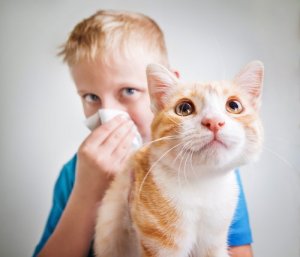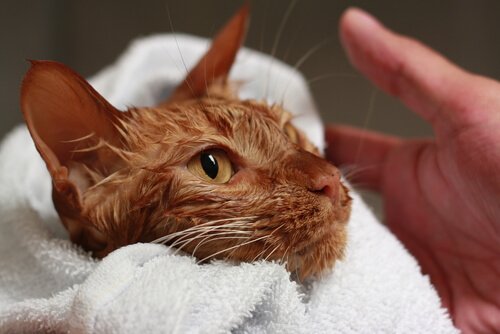Cat Allergies: Why Are So Many People Affected?

For years we’ve heard people say they have cat allergies. You may have been about to greet a relative or a close friend and, just before they hug you, they stop and back off to ask if we have a cat.
A lack of hugs is annoying but allergies are even more so, and it’s for this reason that avoiding allergens is a must for those who are ailed by them.
So, what exactly causes cat allergies? We’ll explain it below.
The causes of cat allergies
Every type of allergy originates due to a weak immune system. Therefore, people with cat allergies have an immune system that’s a lot more sensitive to bacteria found in cat’s saliva, urine and/or dandruff.
Although many people believe that feline hair is the main cause of cat allergies, that’s not the case at all. In reality, it’s mainly dandruff and other types of dead feline skin that cause them.
The probability of allergens coming from this source is, in fact, 5 times greater than with dust. This is mainly because these particles are lighter and remain in the air longer. Thus, the possibility of inhaling them increases.
Symptoms of cat allergies

Like many other conditions of this type, cat allergies are highly annoying and extremely uncomfortable. The most common symptoms are:
- Swelling, coughing and wheezing
- Itching caused by hives or a rash on the chest and face
- Red, itchy, watery eyes
- Redness on the skin, mainly where a cat scratched, bit, or licked you.
- Sneezing, together with a runny, itchy, stuffy nose followed by nasal congestion.
- Sore throat
Do be particularly alert if you’ve never had cat allergies before and if you have any of the above symptoms. At first glance, the symptoms may seem like you’re catching a cold.
However, if you notice that they always appear when you are near cats, then go to an allergist. They’ll be able to evaluate your specific case and then determine whether or not you could be allergic to cats.
Not all felines produce the same degree of allergies. For example, males have more secretions than females, and this brings with it a higher risk of cat allergies. However, if a male is neutered then it’ll have fewer secretions and so the risk of allergies will decrease.
Treatments for cat allergies
It’s rather common to live with a cat and then be diagnosed with cat allergies. Logically, the first thing a doctor will recommend is for you to get rid of it.
However, we’re quite aware that an animal becomes part of your family as soon as you adopt them. Your love for him or her can’t be described. So, for that reason, we’ll give you some tips on how you can reduce your cat allergies without having to resort to losing your feline friend.
As with everything, it’ll all depend on the kind of allergy you suffer from. But, if you follow these tips at home, then things can improve a lot for you or anyone who might be ailed by such annoying symptoms.

Things to avoid
- Don’t let your cat inside your bedroom. If you’re like most people then you probably spend a lot of time in yours. Not allowing a cat to roam around your own personal space will ensure that there are no remaining cat skin particles that may cause allergies.
- Avoid having surfaces that dead skin will stick to around your house. For example, remove rugs and carpets as these textiles easily trap cat dander and will considerably increase your chances of inhaling it and making your allergy worse.
- Wear a mask when you sweep, dust, or vacuum. It’ll keep you from inhaling cat dander. Take it a step further and get a mask that has a filtering system. (There are many such products on the market.) Furthermore, you can also wear it every time you sit and play with your feline friend.
- Bathe your cat and brush it often (while you wear your new mask). Or, delegate the task to someone else who’s willing to do it. Brushing the cat twice a day will remove most of the dead skin and can help solve this problem.
- If it’s male, then neuter it. As we said above, sterilized cats have fewer secretions. So, if you want to avoid cat allergies then it’s best to snip your feline.
Conclusion
While the above might help, it may not be enough. It’s hard, but if having a cat around is endangering your health or the health of your family then you must consider finding another loving home for it.
Don’t assume that you can just wait it out and it’ll go away. Cat allergies don’t just naturally get better over time; on the contrary, they might get worse. Out-of-control allergies can do more than make your life miserable, they can also increase your risk of asthma, which is a serious life-threatening condition.
And, as always, consult your veterinarian. They can tell you all about formulas and medications for cats that can decrease the excess of dander and improve your health.
For years we’ve heard people say they have cat allergies. You may have been about to greet a relative or a close friend and, just before they hug you, they stop and back off to ask if we have a cat.
A lack of hugs is annoying but allergies are even more so, and it’s for this reason that avoiding allergens is a must for those who are ailed by them.
So, what exactly causes cat allergies? We’ll explain it below.
The causes of cat allergies
Every type of allergy originates due to a weak immune system. Therefore, people with cat allergies have an immune system that’s a lot more sensitive to bacteria found in cat’s saliva, urine and/or dandruff.
Although many people believe that feline hair is the main cause of cat allergies, that’s not the case at all. In reality, it’s mainly dandruff and other types of dead feline skin that cause them.
The probability of allergens coming from this source is, in fact, 5 times greater than with dust. This is mainly because these particles are lighter and remain in the air longer. Thus, the possibility of inhaling them increases.
Symptoms of cat allergies

Like many other conditions of this type, cat allergies are highly annoying and extremely uncomfortable. The most common symptoms are:
- Swelling, coughing and wheezing
- Itching caused by hives or a rash on the chest and face
- Red, itchy, watery eyes
- Redness on the skin, mainly where a cat scratched, bit, or licked you.
- Sneezing, together with a runny, itchy, stuffy nose followed by nasal congestion.
- Sore throat
Do be particularly alert if you’ve never had cat allergies before and if you have any of the above symptoms. At first glance, the symptoms may seem like you’re catching a cold.
However, if you notice that they always appear when you are near cats, then go to an allergist. They’ll be able to evaluate your specific case and then determine whether or not you could be allergic to cats.
Not all felines produce the same degree of allergies. For example, males have more secretions than females, and this brings with it a higher risk of cat allergies. However, if a male is neutered then it’ll have fewer secretions and so the risk of allergies will decrease.
Treatments for cat allergies
It’s rather common to live with a cat and then be diagnosed with cat allergies. Logically, the first thing a doctor will recommend is for you to get rid of it.
However, we’re quite aware that an animal becomes part of your family as soon as you adopt them. Your love for him or her can’t be described. So, for that reason, we’ll give you some tips on how you can reduce your cat allergies without having to resort to losing your feline friend.
As with everything, it’ll all depend on the kind of allergy you suffer from. But, if you follow these tips at home, then things can improve a lot for you or anyone who might be ailed by such annoying symptoms.

Things to avoid
- Don’t let your cat inside your bedroom. If you’re like most people then you probably spend a lot of time in yours. Not allowing a cat to roam around your own personal space will ensure that there are no remaining cat skin particles that may cause allergies.
- Avoid having surfaces that dead skin will stick to around your house. For example, remove rugs and carpets as these textiles easily trap cat dander and will considerably increase your chances of inhaling it and making your allergy worse.
- Wear a mask when you sweep, dust, or vacuum. It’ll keep you from inhaling cat dander. Take it a step further and get a mask that has a filtering system. (There are many such products on the market.) Furthermore, you can also wear it every time you sit and play with your feline friend.
- Bathe your cat and brush it often (while you wear your new mask). Or, delegate the task to someone else who’s willing to do it. Brushing the cat twice a day will remove most of the dead skin and can help solve this problem.
- If it’s male, then neuter it. As we said above, sterilized cats have fewer secretions. So, if you want to avoid cat allergies then it’s best to snip your feline.
Conclusion
While the above might help, it may not be enough. It’s hard, but if having a cat around is endangering your health or the health of your family then you must consider finding another loving home for it.
Don’t assume that you can just wait it out and it’ll go away. Cat allergies don’t just naturally get better over time; on the contrary, they might get worse. Out-of-control allergies can do more than make your life miserable, they can also increase your risk of asthma, which is a serious life-threatening condition.
And, as always, consult your veterinarian. They can tell you all about formulas and medications for cats that can decrease the excess of dander and improve your health.
This text is provided for informational purposes only and does not replace consultation with a professional. If in doubt, consult your specialist.








